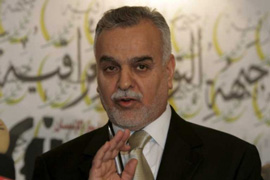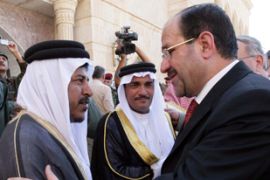The talks began on Saturday and were to continue on Sunday, the official from Talabani’s office said.
“Yesterday the three-member presidency, the prime minister and Mr Massoud Barzani held a meeting to look into ways of solving outstanding issues and to decide on the summit,” he said, referring to a political summit called by al-Maliki at a date still to be specified.
“Today there are more meetings between the leaders. The summit will be held a couple of days later.”
The official described the weekend talks as “preparatory.”
Sunni boycott
The Sunni faction left al-Maliki’s Shia-dominated government on August 1, but he has said that the door remains open for their return.
On Thursday, Talabani and al-Maliki announced the formation of an alliance grouping the Shia Dawa party and Supreme Iraqi Islamic Council and the Kurdish factions of Patriotic Union of Kurdistan (PUK) and Kurdish Democratic Party (PDK).
But the National Concord Front, the main Sunni Arab political bloc in the country’s 275-member parliament, criticised the new tie-up as a “futile” exercise.
Alliance denied
Speaking to Al Jazeera, Tariq al-Hashimi, the Iraqi vice-president, has denied that Saturday’s political leaders’ meeting discussed the issue of his party, the Iraqi Islamic party, joining the newly formed four-party Shia-Kurdish alliance.
Al-Hashemi, who is a leader of the Iraqi Islamic Party, denied that his party had joined the Shia-Kurd alliance.
 |
Al-Hashemi has complained that al-Maliki
ignores his suggestions [AFP] |
“The four-party alliance will actually add nothing to the political process, as these four parties are already [taking part] in authority and had very old strategic alliances even before the fall of [Saddam Hussein’s] regime,” he said.
“That is why we do not believe that this alliance will change the current political equation.”
He said: “I affirm, through Al Jazeera, that the Iraqi Islamic Party does not currently have the intention to join the four-party alliance.
“We have new options and a new vision to handle the escalating political situation.
“We will probably propose a new plan to promote national reconciliation on the basis of an agreement on common, basic issues.”
Gradual troop cut
In another development, the New York Times reported on Saturday that George Bush, the US president, intended to announce in September plans for gradual troop reductions from Iraq – but at levels far short of those sought by his congressional critics.
One US administration official made it clear that the goal of the planned announcement was to counter public pressure for a more rapid reduction and to try to win support for a plan that could keep American involvement in Iraq on “a sustainable footing” at least through the end of the Bush presidency.
Deadly attacks
In continued violence, 10 people were killed and 28 others injured on Sunday when mortar shells landed on a residential neighbourhood in east Baghdad, Iraqi police said.
A number of houses and civilian cars were damaged in the attack, the sources said.
Ambulances transferred the casualties to the city’s hospital.
Speaking to Al Jazeera from the Iraqi capital, Ali Mahmud, an Iraqi journalist, said a number of explosions were heard at around 10:30am local time on Sunday in east Baghdad.
Mortar shells
Iraqi security sources told Mahmud that the explosions were caused by mortar shells landing on a residential neighbourhood in al-Ubaidi district of east Baghdad.
A report from the Associated Press news agency quoting the police put the number of dead at 12 and the wounded at 31.
Women and children were among the dead and wounded, and some houses in the neighbourhood were damaged, according to police.
On Saturday, about 16 mortar shells hit houses in the mainly Shia residential area of Sharqiya in Khalis, 80km north of Baghdad, on Saturday.
Three people were killed 24 wounded in the attack, according to local police.
In Kirkuk, broken glass and other debris were being swept from the bloodstained pavement, hours after a series of bombs struck commercial areas in the disputed city, killing at least four people and wounding 38.

